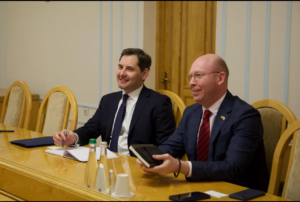
Two years on: our view on Ukraine
 Saturday, February 24 marks two years since Russia invaded Ukraine and sparked a conflict that has killed thousands of civilians and military personnel, displaced millions of Ukrainians and injected chaos into the country’s administrative, social and economic structures.
Saturday, February 24 marks two years since Russia invaded Ukraine and sparked a conflict that has killed thousands of civilians and military personnel, displaced millions of Ukrainians and injected chaos into the country’s administrative, social and economic structures.
Oleksiy Starodubov is Tetra Tech’s Senior Business Development Advisor in Ukraine and has witnessed the disruption of war from his home in Kyiv. In this blog, written in observance of the anniversary of the invasion, Oleksiy reflects on how Ukraine can keep delivering for its people and how the international community can support that work.
February 24, 2024: A reflection point
As of February 2024, more than six million refugees had fled Ukraine for other parts of the world and more than five million Ukrainians are displaced internally. Homes, businesses, communities, and cities across the country have been ravaged by war.
As the Government of Ukraine works to rebuild and maintain resilience amid active conflict, it is also looking at how it can effectively support the needs of its people. A key challenge in achieving this, which predates Russia’s invasion, is the need for transparency to promote trust between citizens, the government, and local authorities. To address this situation, there needs to be reconsideration of the economic and social priorities for Ukraine. And to ensure the support delivered is citizen-focused, there needs to be a significant political shift to improve dialogue between the people and the government.
Rethinking policy for future stability
To start earning this trust, Ukraine’s policies and interventions must match the real needs of the population. People who need a new hospital or reliable water supply to their community don’t want to see a new stadium or swimming pool being built. More specifically, in any efforts to support Ukrainian people, it is vital to recognise the varying needs of the different territories – areas not in the conflict zone, liberated territories, temporarily occupied territories, and areas of frontline conflict.
Where I see strength is in effective leveraging of Ukraine’s existing institutions at regional and local levels. Ukraine has a strong structure of regional development agencies that define strategic social and economic challenges and opportunities. These organisations are bridges between local governments, national government, NGOs, educational institutions, and civil society. I think there is an opportunity to review and redefine the role of these agencies. In light of the issues raised by the war, the Government of Ukraine should use them to support new national strategies and to channel funds from development finance institutions and assistance from international development agencies, which are increasingly focused on localising the implementation of aid programs.

Tetra Tech’s USAID Energy Security Project team in Kyiv, Ukraine.
Addressing the priority stretch – how can Ukraine be supported across competing recovery needs
The Government of Ukraine obviously had to reconsider national priorities because of the ongoing war and efforts to accelerate integration into the European Union (EU). Ukraine is a conflict zone economy now and will be a post-conflict economy when the war is over. The government needs to focus on repairing damaged infrastructure (water and power networks, housing, schools, hospitals, bridges and roads) and public services (education, healthcare, social safety). They are all priorities that need to be addressed concurrently. So what’s ahead?
In terms of European integration, the Government of Ukraine should prepare and adopt a national strategy for economic transformation based on principles of the European Green Deal. In addition to national initiatives, the reviewing and strengthening of the aforementioned regional economic and social development strategies and agencies will be vital. New regional priorities need to support those essential first needs of citizens – water, food, housing, electricity, heating and basic public services.
Energy security, economic development, and support to conflict-affected regions are all high priorities and they are areas where Tetra Tech has a long history of experience – globally and specifically in Ukraine since 1996. We currently implement the largest internationally funded energy sector project in Ukraine, the $700 million USAID Energy Security Project. Since project launch in 2018, we have worked to build energy system resilience, harmonise legal and regulatory frameworks with EU standards, and prepare for a postwar just energy transition. Following Russia’s invasion, we pivoted to directly helping utilities and municipalities keep the lights on and heat flowing. As the conflict continues, this work is giving us added insight into the energy needs of communities and regions and the challenges they face. Our view of the situation spans from the very top strategic level, all the way down to the kitchen table.
I think that this broad, interconnected view of infrastructure systems is how we can help identify where new priorities will emerge. We see how challenges in the energy sector affect food security, social infrastructure, and water and sanitation services. Tetra Tech solves similar problems around the world and is transferring that expertise to the Ukrainian context.

The role of good relationships – at home and abroad
For support from international donors to be truly effective, there needs to be a community of trust and understanding with Ukrainian institutions and civil society, and a unity of purpose. Currently, all development work in Ukraine is being funded by international donors, because nearly all of the domestic budget is going towards the armed services and the war effort. So, the relationships between donors and the Government of Ukraine are critical. Tetra Tech works with Ukrainian beneficiaries of a Multi-Agency Donor Coordination Platform for Ukraine (MDP) – a network that operates via strong connections to government ministries. The MDP allows us to get information on methods of funding, generate logistical connections, and support effective and informed decision making.
Trusted implementers are essential in times like these. They know government structures in countries of delivery, while also bringing experience of delivering to the standards and rules applied to donor funding. They have the soft power connections that can balance the requirements of donors and beneficiaries, and know when to work with civil society organisations, government departments, technical specialists, et al., to support delivery.
More important, perhaps, is how these implementers engage with the specialist and extremely knowledgeable civil society organisations that exist within Ukraine. Ukraine has a highly educated and passionate workforce, with extensive experience of international work. It is imperative that foreign aid implementers build these local organisations into their project plans to deliver the most effective solutions.

Oleksiy (R) with Llyr Rowlands, Unit President for Tetra Tech’s international energy services team.
Enabling private sector investment amid conflict
Opportunities for foreign investors are inextricably linked to the security situation, and the Government of Ukraine is very aware of this.
Despite the security risks, the Ukrainian economy has been resilient during the two years of war. It has had strong support from western partners. The United States, United Kingdom, Germany, France, Norway, Japan, and many others have demonstrated their belief in Ukraine’s importance and potential, and in doing so have signalled to their private companies the potential in Ukraine’s markets.
The agrarian and energy sectors have shown particular resilience during the war. Ukrainian agrarians collected 80 million tons of grains and oilseeds in 2023, which was even more than in pre-war 2020. There will also continue to be significant opportunities in the energy sector in Ukraine. Substantial investments are needed to ensure that gas and electricity networks can meet short- and mid-term consumer demand, while at the same time exploiting the huge untapped potential for energy efficiency and decarbonisation in all sectors of the economy. Ukraine is also rich in natural resources, including abundant renewable energy resources, vast geological gas storage near EU borders, as well as metal ores used in advanced energy equipment like lithium and titanium.
Tetra Tech can support the prioritisation and advancement of bankable projects that modernise energy infrastructure and advance the clean energy transition on both the supply and demand side. We are also well positioned to support the development of de-risking mechanisms to leverage flow of capital from local and international financiers, including funds or financial products from development finance institutions, MDBs and the private sector.
Tetra Tech explores new opportunities for private sector organisations in Ukraine on a regular basis. We are familiar with the pros and cons of potential investments in Ukraine and due to our strong global experience in conflict- and post-conflict zones we able to consider public-private partnerships with national and local companies as well as new vehicles for foreign investors, including blended finance mechanisms.
Looking ahead
Ukraine still faces tremendous challenges in the face of Russia’s ongoing war. We all hope for a swift end to the brutality. We’re already looking forward to brighter days. To building back better. My fellow Ukrainians are resilient and ready to move forward. My Tetra Tech colleagues and I are here to help.
About the author
Oleksiy Starodubov has more than 20 years of experience in Ukraine’s public and private sectors and in-depth background of working with international financial institutions on development projects, public procurement, privatisation, and public-private partnerships in Ukraine. Within the public sector, Oleksiy has served as a high-level advisor on matters of food security, natural resources, and regional governance, and brings deep knowledge and experience of Ukrainian civil society and its integral role in the country’s present and future.